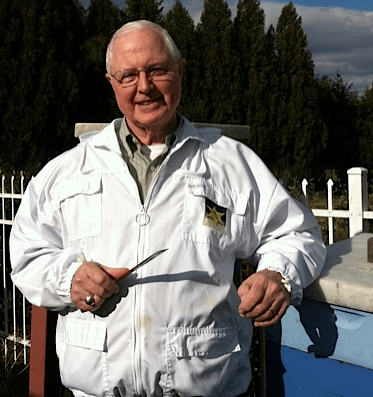Ask A Master Beekeeper:
You Have Questions?
They Have Answers!
Wednesday, March 14, 2018 at 7:00 pm
Brookside Nature Center, 1400 Glenallen Avenue, Silver Spring MD
At our March meeting, members will have the opportunity to ask a panel of three experienced Master Beekeepers about all aspects of beekeeping. To submit your questions, please send them to Pam Hepp (Club Vice President) at pphepp@aol.com by Friday, March 9th.

Barry Thompson
Barry Thompson has been a beekeeper since 1954, starting with a single colony in Tennessee and maxing out at 125-150 colonies as a sideliner in Mississippi and then Maryland. For almost two decades, he provided pollination services to orchards and pick-your-own farms in Montgomery County. He has scaled back to 25-30 colonies and now provides bees to homeowners and public venues. Barry was certified by the Eastern Apicultural Society as a Master Beekeeper in 1996. He is a member of state and national beekeeping organizations and is a co-chairperson for the Pesticide Education Task Force of the North American Pollinator Protection Campaign/ Pollinator Partnership. For 30 years, his "day job" was as a physician-geneticist in the U.S. Air Force, with shorter stints at the Armed Forces DNA Identification Lab (Rockville) and the Defense Advanced Research Projects Agency (DARPA), and five years (2008-2013) as the Medical Director, American College of Medical Genetics and Genomics (Bethesda). Barry ‘s greatest pleasure is the mentoring of fellow beekeepers and the education of the public about honey bees and other pollinators. He frequently addresses garden clubs, scouts, church groups, and school classes.

Brenda Kiessling
Brenda Kiessling started keeping honeybees in the 1970s (“no mites, no nosema, no training, and the bees kept themselves”) and became an EAS Master Beekeeper in 2004. She has led a 4-H beekeeping club since 2002 and has taught the Northern Virginia Consortium 8-week class (“Practical Beekeeping for Beginners”) for the past eight years. Since the 1990s, Brenda has been particularly interested in osmia cornifrons (solitary bees raised for pollination) and has recently started making mead. She is a member of the Northern Virginia Beekeepers Association, American Beekeeping Federation, Eastern Apiculture Society, Maryland State Beekeepers Association, and Virginia State Beekeepers (2nd Vice President in 2016). Her beekeeping travels have taken her to the Apimondia in Dublin, Ireland (2006), Montpelier, France (2009) and Kiev, Ukraine (2013). In 2014, the Beekeepers Association of Northern Virginia honored Brenda with its Lifetime Achievement Award.

Jim Fraser
Jim Fraser is a Montgomery County native. “I grew up in Cabin John, and I now live in Damascus with my wonderful wife Elaine and my two sons, James and Andrew, who are the fourth generation of beekeepers in the family. I grew up with bees and there are few things I would rather do than work my bees. I became an EAS Master Beekeeper in 2014 and I operate around 150 hives for pollination, nucleus colony production, honey, and comb honey. I am also a Brushy Mountain Bee Farm distributor. I am currently the President of the Maryland State Beekeepers Association. I love working bees, talking bees and teaching about bees.” After completing his term as Club Vice President at the end of 2017, Jim was appointed the Montgomery County Beekeepers Association County Agricultural Fair Liaison.

Pam Hepp
Serving as Moderator will be Pam Hepp, MCBA Vice President and Director of educational outreach. “I became a beekeeper in 2013 - took the short course and got my package of bees. My ‘bee cred’ grows each year - I've split hives, caught a swarm, lost a hive, made boxes, and dealt with wax moth. I extract delicious honey and make terrible mead. I like experimenting with my bees - making them ventilation/feeding boxes and feeding them amino acids. When I am not beekeeping, I am a triathlete - I can be found in the pool, cycling the countryside or running the roads. My days are spent on the campus of NIH, administratively supporting the clinical trials of the National Eye Institute. When I grow up, I'd like to be a farmer, growing heirloom tomatoes, collecting fresh eggs, herding goats and, of course, keeping bees.” One of Pam’s goals is to become a Master Beekeeper.
